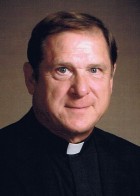The attitude of true humility leads to justice

Father R. Michael Schaab
By Father R. Michael Schaab
Fourth Sunday in Ordinary Time/Jan. 29
Zephaniah 2:3;3:12-13; Psalm 146:6-7,8-9,9-10; 1 Corinthians 1:26-31; Matthew 5:1-12a
Tim McGraw’s popular song “Humble and Kind” has these words in the refrain:
“Hold the door, say please, say thank you,
Don’t steal, don’t cheat and don’t lie.
I know you got mountains to climb, but
Always stay humble and kind.”
Humility, as presented in the song, is a behavior. Humility, as presented in the readings for the Fourth Sunday of Ordinary Time is an attitude. In the first reading from the prophet Zephaniah we are encouraged to “seek the Lord, all you humble of the earth.” In the Gospel for that Sunday, Matthew’s list of Beatitudes expands our understanding of humility and shows how God responds to these various manifestations of humility. The humble of the earth are poor in spirit and God gives them the Kingdom; they mourn and God comforts them; they are meek and God gives them the land, etc.
Quite often that is where our reflection ends — we’re humble, God appreciates it and responds. A closer reading of Zephaniah makes it clear, though, that humility is not an end in itself. Rather, it’s a means to an end: “Seek the Lord, all you humble of the earth, who have observed his law; seek justice.” The attitude of true humility leads to justice, which is the purpose for being humble in the first place. It also leads us to the readings for the Fifth Sunday of Ordinary Time.
“YOUR LIGHT MUST SHINE”
In the responsorial psalm for that Sunday we repeat, “The just man is a light in darkness to the upright.” In the other readings we find examples of exactly how that light appears when we live upright and justly — by removing oppression, false accusations and malicious speech, by being gracious and lending, by bestowing bread on the hungry and by giving to the poor. But this also raises a question: “Why should just acts, performed by a humble person, be done for everyone to see?” Doesn’t it seem like we’re making a show for people when we let our “light shine before others?”
I’d have to agree that it seems contradictory, maybe even hypocritical, to claim to be humble while at the same time making a show of our own goodness, if it weren’t for the last sentence of the Gospel for the Fifth Sunday: “Your light must shine before others, that they may see your good deeds and glorify your heavenly Father.” Just women and men let their good deeds be seen, not to attract attention to themselves, but to be the light that will attract others to give glory to God. Furthermore, if we fail to take advantage of an opportunity to act justly, we actually fail in our duty to be a light in the darkness.
Now, three conclusions. First, the justice we’re talking about here is not simple “human” justice but “biblical” justice. The difference is that while human justice is giving people what they deserve, biblical justice is giving people what they need. Biblical justice is more like what we call mercy. That’s why God is simultaneously both merciful and (biblically) just.
Second, anyone serious about a new evangelization has to go back to these two Sundays and ask how well our parishes are letting their light shine in the darkness. Evangelization is more than just words about the Church. Evangelization is the Church living justly “as a light in the darkness” of this world.
Third, if anyone needs an easy way to check the liturgical readings for each day, our bishops make them easily available on the Internet at usccb.org/bible/readings/index.cfm.
—–
Father R. Michael Schaab is a senior priest of the Diocese of Peoria who gives retreats and days of recollection, and who fills in as presider at parish Masses on weekends. He resides on a hobby farm in Putnam County.





